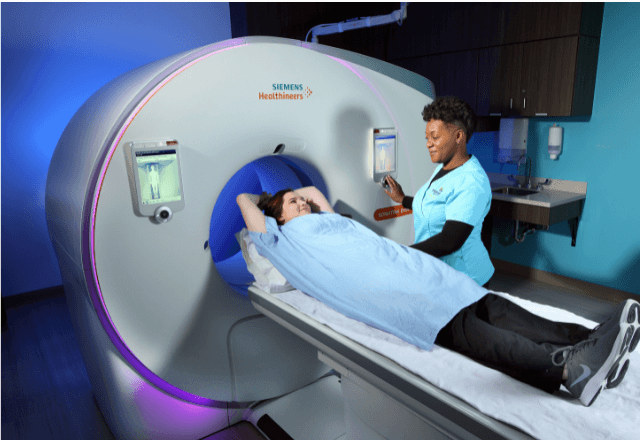Radiology Testing for Tumor Detection in Companion Animals
In recent years, radiology has become a critical tool in the healthcare of companion animals. The ability to visualize internal structures and detect abnormalities such as tumors is essential for early diagnosis and effective treatment planning. Radiological examinations, particularly computed tomography (CT) and magnetic resonance imaging (MRI), are increasingly being used to identify and characterize tumors in pets. This service focuses on providing advanced radiology testing tailored specifically to the needs of companion animals, offering accurate and reliable detection of malignant growths.
The procedure involves a thorough evaluation using state-of-the-art technology that ensures precise imaging. The process begins with careful preparation of the animal patient, which includes sedation when necessary to ensure comfort and cooperation during the examination. Following this, detailed scans are taken under controlled conditions, ensuring high-quality images for accurate interpretation.
Our radiology service is designed to provide a comprehensive approach to diagnosing tumors in companion animals. By leveraging advanced imaging techniques such as CT scans and MRI, we can visualize soft tissue structures with remarkable clarity, enabling precise identification of even the smallest tumors. This capability significantly enhances our ability to detect malignancies early, improving treatment outcomes.
The importance of this service cannot be overstated. Early detection of tumors in pets often translates into better prognosis and higher quality of life for affected animals. Regular screening using radiological methods can help identify potentially harmful growths before they become more severe or widespread. Our team works closely with veterinary professionals to ensure that each examination is conducted according to best practices, adhering to international standards such as ISO and ASTM where applicable.
For quality managers and compliance officers overseeing the healthcare of companion animals, this service represents a critical component in maintaining high standards of care. R&D engineers involved in developing new diagnostic tools will also find value in understanding how radiological techniques contribute to advancements in veterinary oncology. Procurement teams can benefit from knowing about the latest technology available for such specialized examinations.
The following table provides an overview of some common radiological findings associated with tumors in companion animals:
| Findings | Description |
|---|---|
| Bilateral hilar lymphadenopathy | Increased size and density of the mediastinal lymph nodes. |
| Masses in the thorax or abdomen | Potential indicators of neoplastic activity. |
| Enlarged liver with nodular changes | Suggestive of metastatic disease. |
| Obstructive lesions within airways or gastrointestinal tract | May indicate tumor growth obstructing these areas. |
Our service offers a range of benefits that make it unique and valuable for those involved in the healthcare of companion animals:
- Use of cutting-edge technology to ensure accurate diagnosis.
- Careful preparation of animal patients to minimize stress during examinations.
- Collaborative approach with veterinary professionals for comprehensive care.
In conclusion, radiology testing plays a vital role in detecting tumors at an early stage, which is crucial for the successful treatment and management of diseases affecting our pets. By offering this specialized service, we aim to contribute significantly to improving the health outcomes of companion animals worldwide.
Why It Matters
The timely detection of tumors in companion animals can greatly influence their chances of recovery and overall well-being. Early diagnosis allows for more effective treatment strategies, potentially extending life expectancy and enhancing quality of life. For pet owners, the emotional burden associated with managing a chronically ill or terminal condition is significantly reduced when early intervention is possible.
From a broader perspective, efficient tumor detection contributes to better public health practices by reducing the spread of communicable diseases that may be linked to certain types of tumors. Additionally, advances in radiological techniques can lead to improved understanding and treatment protocols for human cancers as well, benefiting not just pets but also humans.
Healthcare providers who rely on accurate diagnostic tools like those provided through this service play a crucial role in ensuring the integrity of medical practices across various sectors. By leveraging precise imaging technologies, they contribute to reducing errors and improving patient care standards globally.
Industry Applications
Radiology testing for tumor detection in companion animals has numerous applications within the veterinary field:
- Detecting primary tumors in various organs including lungs, spleen, kidneys, and pancreas.
- Evaluating metastatic spread to other parts of the body.
- Assessing response to initial treatments post-diagnosis.
The following table highlights some specific scenarios where radiological examinations are particularly useful:
| Situation | Description |
|---|---|
| Initial diagnosis of suspected neoplasia | Determining the nature and extent of the tumor. |
| Evaluation after surgical resection | Ensuring complete removal and checking for residual disease. |
| Monitoring long-term progress following chemotherapy or radiation therapy | Identifying recurrence or progression early on. |
In each of these scenarios, the accuracy and reliability offered by modern radiological methods are paramount. They help veterinarians make informed decisions regarding treatment plans, thereby improving patient outcomes.
Competitive Advantage and Market Impact
This service provides a competitive edge in several key areas:
- Precision: Utilizing high-resolution imaging that allows for detailed analysis of even subtle changes within the body.
- Comprehensive Care: Offering end-to-end support from consultation to follow-up care, ensuring optimal patient management.
- Innovation: Continuously investing in new technologies and methodologies to stay ahead of evolving trends in veterinary oncology.
The impact on the market is substantial. As demand for advanced diagnostic services grows, our service stands out as a leader in providing comprehensive radiological solutions tailored specifically for companion animals. This positioning helps us attract clients seeking top-tier care and innovation in their practices.
Our approach not only benefits individual practitioners but also contributes to broader advancements in the field of veterinary medicine. By setting new benchmarks for diagnostic accuracy, we inspire other providers to adopt similar standards, ultimately benefiting all stakeholders involved in pet healthcare.





